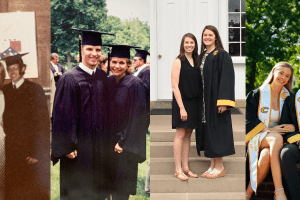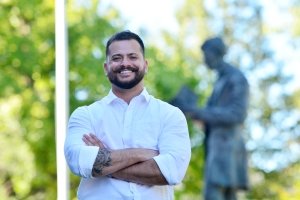Centre plays integral role in community’s efforts to combat homelessness
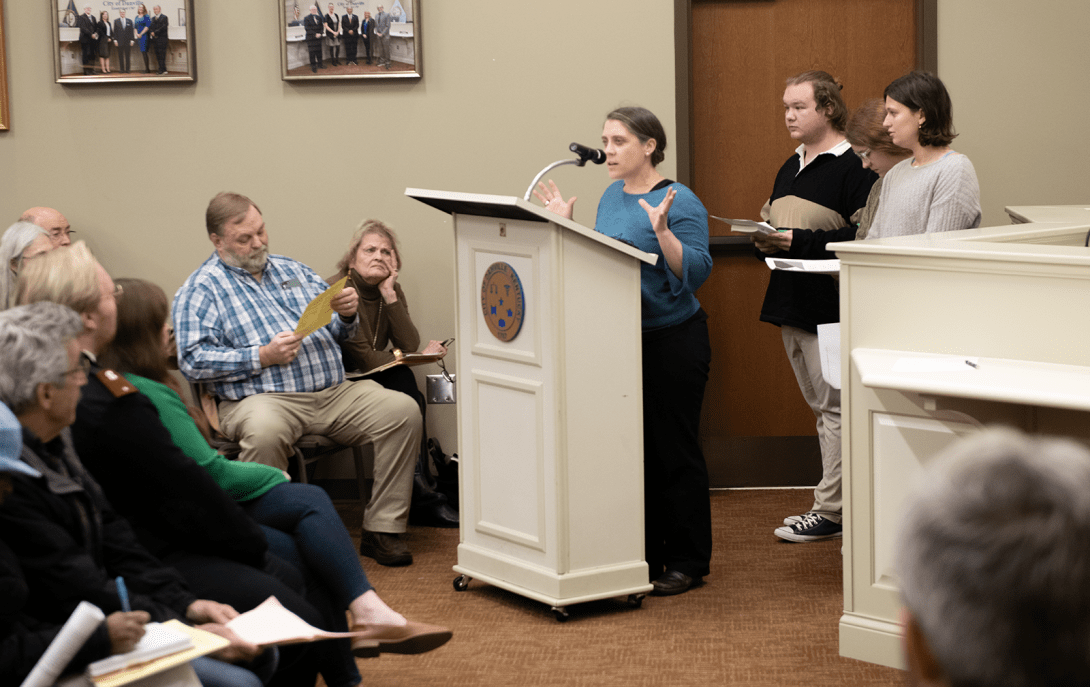
On a chilly December evening in 2023, speaker after speaker stepped to the podium in Danville City Hall to discuss the issue of homelessness in the local community. The standing-room-only crowd overflowed into the basement to watch a live stream of the forum.
Early in the evening, Associate Professor of Sociology Kaelyn Wiles introduced three Centre College students who were presenting the findings of their work in her Sociological Research Methods class, which compiled data on the root cause of homelessness in the area.
“It was an incredible learning experience for the students, and I hope it was equally meaningful to the community,” said Wiles. “That’s what I think makes community learning so special.
“We want our students to get a good education, and we also want them to be really good citizens. And this type of community-based learning really supports that.”
That meeting proved to be a watershed moment for the community, spurring the creation of a 12-member task force and a renewed sense of solidarity among local agencies and nonprofits working to address the issue and help those experiencing housing insecurity.
It wasn’t the first time Centre students and faculty played an integral role in the surrounding community’s efforts to address the issue — and it certainly wasn’t the last.
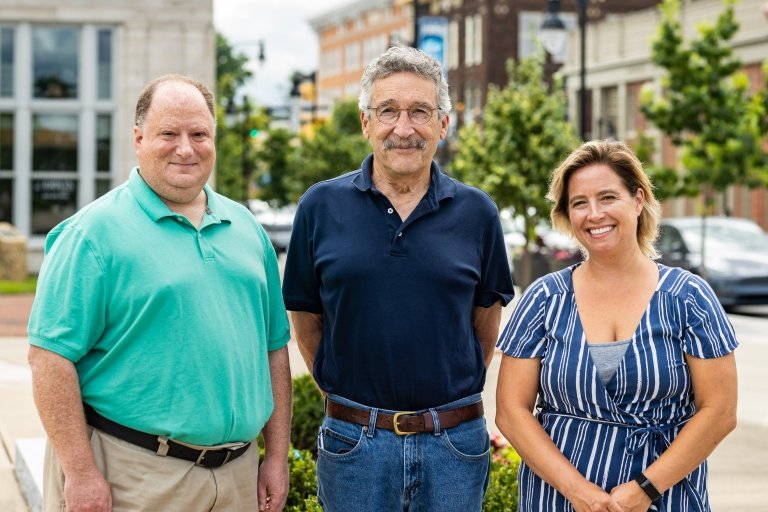
A MISSION IN ACTION
Centre College’s commitment to community engagement begins with its mission statement, which lays out a promise to “prepare students for lives of learning, leadership, and service.”
Students’ involvement in the community starts their first day on campus, with newcomers participating in the Delve into Danville program to learn more about local nonprofits, businesses and entrepreneurs. Opportunities to engage in service are ever-present, through the College’s Office of Civic and Community Engagement, the Alpha Phi Omega service organization, CentreWorks, Greek life, clubs and much more.
“Service is a key tenet of the Centre College experience,” said Jessie Weasner, Director of the Office of Civic & Community Engagement. “The work of faculty, students and staff to help Danville address homelessness is just one example of how our office and the College put our values into action in a way that is beneficial to everyone involved.”
In addition to helping faculty connect with local partners to foster community learning opportunities, Weasner’s office also provides course development grants to professors to aid in designing classes that take the classroom into the community and integrate student learning into the surrounding area.
“It’s been inspiring to see how the Centre community embraces service and engagement opportunities in our area,” Weasner said. “History has shown how our deep involvement and partnerships throughout the area strengthen Centre and our larger community.”
LAYING THE FOUNDATION
For Associate Professor of Computer Science and Data Science Dave Toth, the idea of a transitional housing community in Danville — comprised of tiny homes — came about during the COVID-19 pandemic, when he discovered how old shipping containers were being transformed into livable spaces.
“I got interested in that, and then thought, ‘We have so many people experiencing homelessness, and if we could build these shipping container houses, why are we not doing so and taking care of people?’”
That inspiration led him to become involved in the early stages of what would become the Boyle County Homelessness Task Force and inspired him to create a class designed to engage Centre students in addressing this issue.
“I thought, instead of organizing an alternative spring break service trip where we go someplace else and help people, wouldn’t it be cool if we did it locally,” he said.
So Toth got to work developing a course titled Fixing Homelessness in Danville — aided by a grant from the Bonner Foundation and administered through the Office of Civic and Community Engagement. A part of Centre’s general education curriculum focusing on writing, speaking and collaboration, the course provided juniors and seniors from a variety of majors with the opportunity to address topics of real-world significance.
“The entire point of the class itself, outside of the Fixing Homelessness in Danville, was to cultivate an atmosphere of community learning in the classroom, to challenge students that don't know each other to come together and work on a project together, hands on,” said Winnie Combs ’25, a Nashville native who took the class in the fall semester of her senior year.
Students discussed the causes of housing insecurity and heard from community members about historic and ongoing efforts to address the issue. They also analyzed the findings Wiles’ students had presented the year before.
“There is a problem that needs a solution, so here our class is coming together to look for one,” Combs said.
Students were divided into teams and tasked with researching and reporting on specific aspects of a plan for a transitional housing community. Not only did the final project have a real-world impact, but the students also found themselves venturing outside the classroom to solve problems they had never encountered before.
“My group was tasked with identifying land for the village, and we did things like overlay maps of the sewer lines with plots of land,” Combs said. “I went down to the planning and zoning office and called the archive to have them pull the actual sewage records to see what was there.
“It pushed me out of my comfort zone,” Combs admitted. “It was a good experience for me.”
The educational benefit of this work cannot be overlooked, Wiles said. These sorts of challenges help students grow and learn crucial problem-solving skills that will last a lifetime.
“I’ve had students giving evaluations say a class was terrible and the work took way too much time, and then they come back two years later when they’re graduating and say, ‘This is what mattered,’” Wiles said.
Through his work with the task force, Toth’s goal was to compile a document that could serve as a starting point for a true plan of action. He helped guide the students in producing a comprehensive report, which they presented to local leaders and members of the Danville and Centre communities.
“I was amazed,” said Colin Raitiere, a retired family doctor who was elected chair of the newly formed Boyle County Homelessness Coalition Board. “The people in the audience were all blown away. You could look around and see them talking about the possibilities.”
The coalition members galvanized around the option of transitional housing.
“Up until that point, the whole question of what to do about the issue of the unhoused had been sort of unclear,” he said. “There were a lot of conversations and a lot of questions, then all of a sudden we’re presented with this plan where a lot of the hard work was done.”
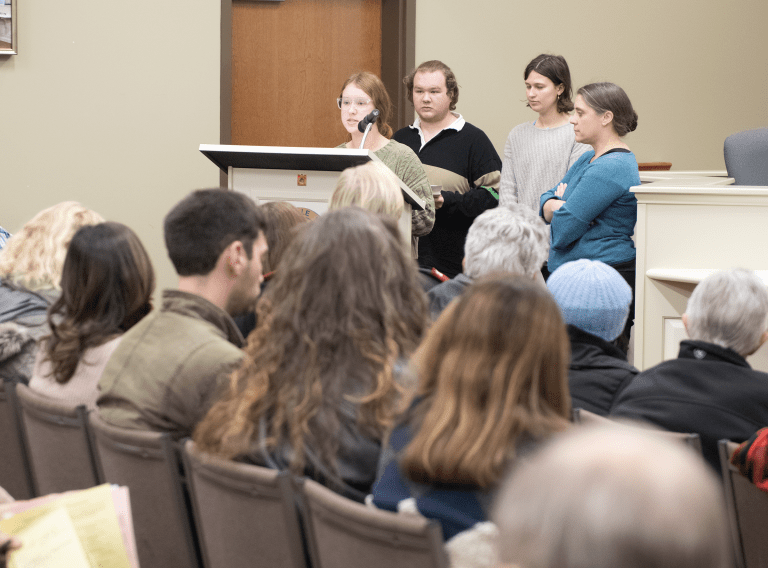
THE BUILDING BLOCKS
If the contributions of Wiles’ students in determining the roots of the problem and Toth’s students in proposing a solution weren’t enough, another Centre College staff member helped a crucial piece of the puzzle fall into place.
One of the biggest challenges of the project was finding a location where such transitional housing would be both appropriate and welcomed. That’s where CentreWorks Director Jennifer Gander entered the picture.
The Boyle County native helps Centre faculty and staff forge stronger bonds within the local community. She knew the Family Services Association of Boyle County was seeking a way to utilize land adjacent to its Third Street location to improve the community.
“The first issue was the same issue the task force dealt with previously: who’s got land and who in the community is going to want a tiny home community near them,” Raitiere said. “And we were always met with absolute resistance.
“Then, all of a sudden, we have land with an enthusiastic owner who is pushing for us to do this. So that major obstacle is gone.”
Family Services plans to offer counseling services and formulate pathways to independence for residents of the village, which will be conveniently located near the Boyle County Health Department and not far from Ephraim McDowell Medical Center.
The coalition board presented its plan, a modified version of that proposed by Toth’s class that features both one-bedroom units and three-bedroom homes suitable for small families, to the county government and gained key initial approval from the local planning and zoning commission. The coalition has applied for grant funding and is working with Heart of Kentucky United Way in preparation to begin accepting donations.
Possible sources of funding were even something Toth and his students researched for their project.
“What I really wanted was something that we could hand over and hopefully get some funding for and make happen,” Toth said.
Seeing the project come to fruition would be thrilling for Combs and her classmates, but the experience has already made a profound impression.
“All the perspectives that so many students brought to the conversation were super interesting,” she said. “There’s not one solution to fixing homelessness in Danville or anywhere. But coming together to structure the best one for our community was a super cool and evolutionary process.”
It’s an undertaking Wiles believes is beneficial to all parties involved, from the students and the community to Centre College itself.
“I think it’s important for the institution to show that we are part of the community and that we care. That’s important for society,” she said. “And it shows that higher education matters and that research matters. We need to have good people thinking about how to solve problems in the world.”
This article first appeared in the Summer 2025 edition of Centrepiece.

